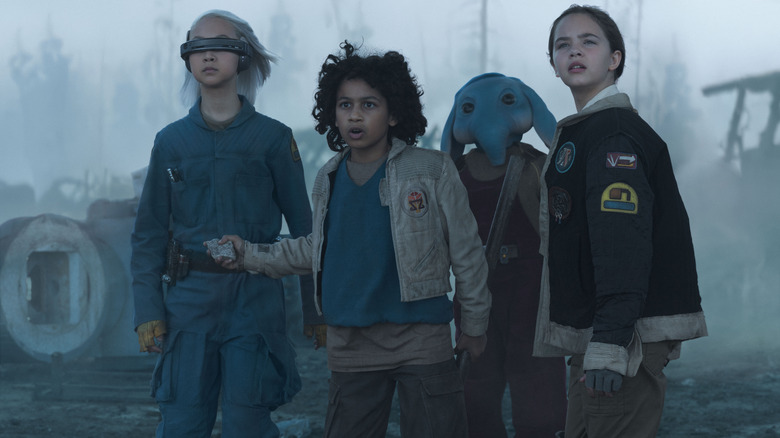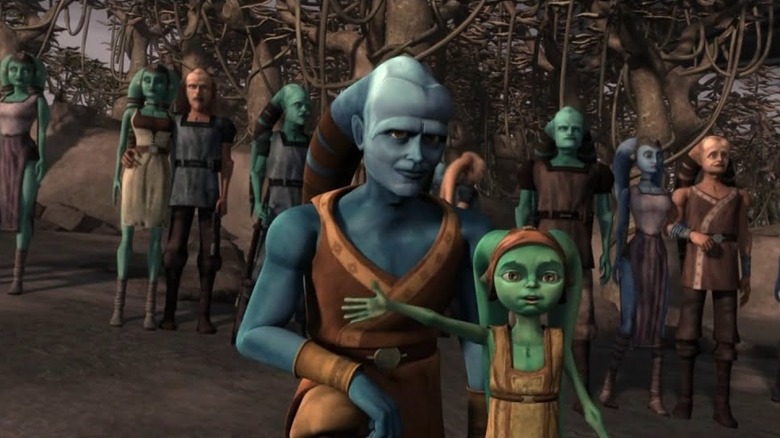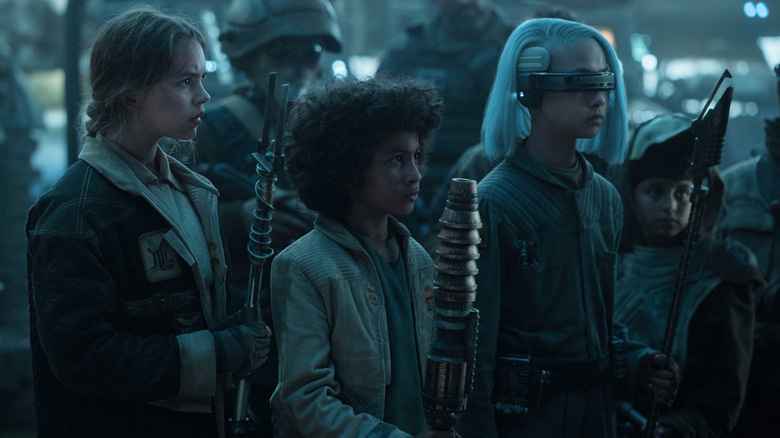This article contains spoilers for “Star Wars: Skeleton Crew” season 1, episode 4, “Can’t Say I Remember No At Attin.”
“Skeleton Crew” has been the biggest surprise related to “Star Wars” since “Andor” took the world by storm with its poignant political drama. Initially sold as a lighter type of “Star Wars” adventure inspired by “The Goonies,” the show has proven to be one of the most original and engaging “Star Wars” projects in years. Sure, it’s aimed more at kids and has a lighter tone, but “Skeleton Crew” also doesn’t shy away from giving us some of the scariest imagery in the franchise (whether that’s a variety of creepy, bloodthirsty alien pirates or a killer robot hunting a group of kids on a dark spaceship).
In episode 4, “Can’t Say I Remember No At Attin,” the show takes a detour from the fun pirate shenanigans to instead deliver a grim and poignant story about the effect of war on children and the cycle of violence, with everyone’s favorite blue elephant alien, Neel (who is voiced by Robert Timothy Smith and, all indicators to the contrary, is not Max Rebo’s relative), arguing in favor of finding solutions other than sending kids to the front lines. It’s a fantastic episode that also has a surprising connection to a tradition that began back in the “Clone Wars” cartoon series: planets engaged in never-ending wars being very French-coded.
When Star Wars becomes about the French Resistance
“Can’t Say I Remember No At Attin” follows the young heroes of “Skeleton Crew” to what they believe is their home planet of At Attin (which is essentially the titular world in “Treasure Planet”), but is actually another one of the Nine Jewels of the Old Republic and a place known as At Achrann. Far from the idyllic suburban home that the kids are familiar with, At Achrann is a planet perpetually at war. (One could even call it the Upside Down version of At Attin.) The conflict involves two tribes, the Troik and the Hattan, who have fought for generations. When we first meet the Troik, they have a distinct feel. For one, they’re at least a little inspired by the Lost Boys from “Peter Pan” in that there are several kids fighting against the adults on the opposing side. However, as soon as we start meeting some of the main players, including their general, it becomes clear the Troik specifically sound French — at least, that’s the case with their leader, General Strix (Mathieu Kassovitz), and his daughter Hayna (Hala Finley).
This brings to mind the Ryloth arc from “Star Wars: The Clone Wars,” in which a group of Jedi are deployed to the planet Ryloth to help the Twi’lek resistance fight against their Separatist oppressors. Part of what makes the story arc memorable is that all the Twi’leks we meet speak with distinct French accents, which showrunner Dave Filoni has said in the past was a direct request from “Star Wars” creator George Lucas. It’s not hard to recognize this creative decision as being one big tribute to La Résistance, the French Resistance during the Nazi occupation in World War II. Given how much of a WWII nerd Lucas is, it makes sense he would bring in some influences from that time period for “Clone Wars” — and he brings in plenty more than that, starting with the war-time radio news announcements at the start of every episode.
Skeleton Crew episode 4 offers a different perspective on war itself
Byy slightly changing focus from pirates to a planet at war where kids are sent to the front lines, “Skeleton Crew” episode 4 does more than just provide a cool reference to the animated “Clone Wars” series. Where the episode really shines is in the way it interrogates the very idea of “Star Wars” as a franchise revolving around war. The moment the show’s young heroes are drafted into the conflict, most of them seem to accept their situation without much protest. But Neel? He refuses to believe that war is the only way forward. Instead, he befriends Hayna and tells her that if he was in charge of a tribe engaged in a generational war, he’d simply apologize and move on. After all, war is no place for children.
This simple yet poignant conversation hits on the fact that the “Star Wars” franchise has always been defined by war while also contrasting nicely with the hotheaded yearning for adventure and action expressed by Neel’s buddy Wim (Ravi Cabot-Conyers). On top of that, it serves as a throwback to Rose Tico’s (Kelly Marie Tran) speech at the end of “Star Wars: Episode VIII — The Last Jedi” when she prevents her fellow Rebel Finn (John Boyega) from carrying out a pointless suicide charge. That’s how we’re gonna win,” she tells Finn. “Not fighting what we hate. Saving what we love.” Sure, “Star Wars” has the word “Wars” in the title and conflict has been at the foreground of every project in the property, but it’s “Skeleton Crew” — the show with the most vulnerable protagonists (literal children!) — that’s finally raising the question of whether the franchise could look beyond warfare.
Given how well “Skeleton Crew” is doing with a simply tale about kids wanting to return home, or how “The Acolyte” delivered an emotional and thrilling story about the darkness behind the righteousness of the Jedi Order without setting it during a time of war, the answer seems to be yes.
New episodes of “Star Wars: Skeleton Crew” drop Tuesdays at 6 pm PST on Disney+.










